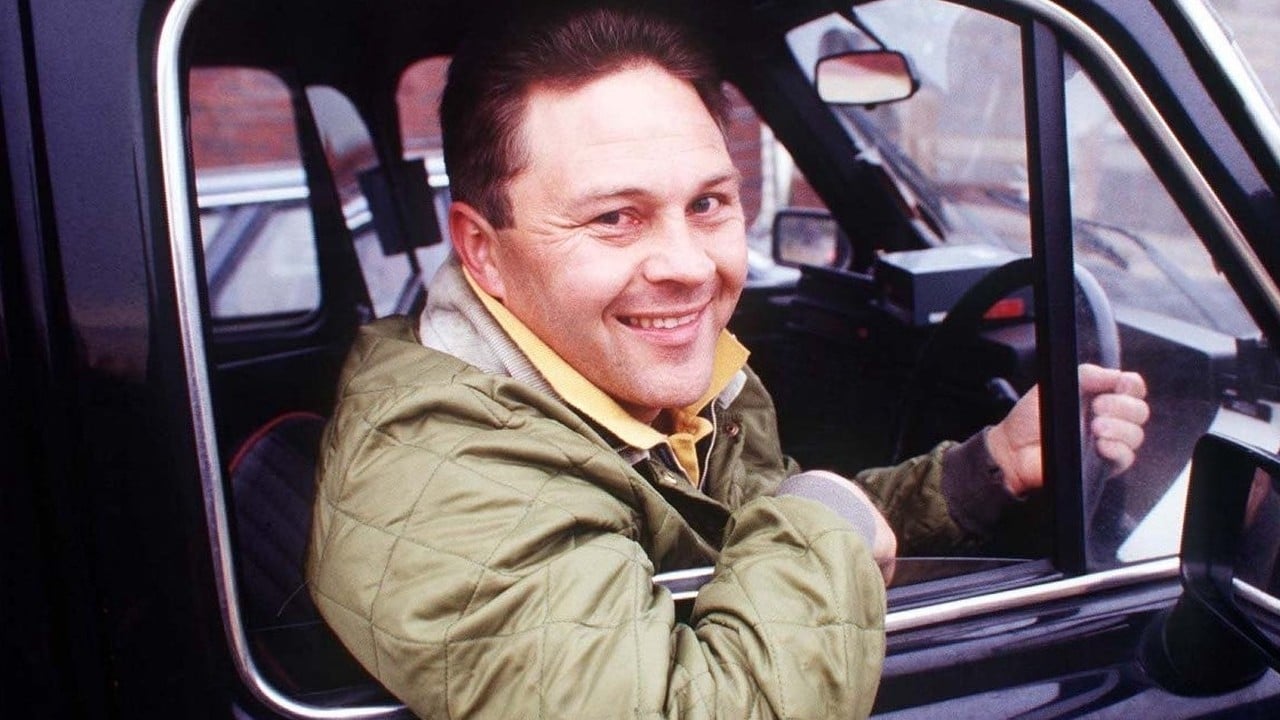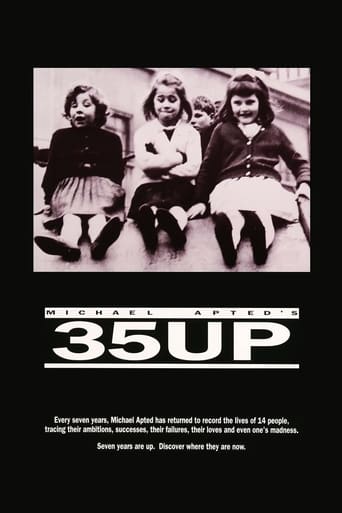Cubussoli
Very very predictable, including the post credit scene !!!
Gurlyndrobb
While it doesn't offer any answers, it both thrills and makes you think.
Anoushka Slater
While it doesn't offer any answers, it both thrills and makes you think.
Lachlan Coulson
This is a gorgeous movie made by a gorgeous spirit.
ElMaruecan82
I've been watching "Siskel& Ebert" reviews for years, but it's only one week ago that I discovered through their "35 Up" review Michael Apted's "Up" documentary series. I saw it from the start and got instantly hooked up.
This is one of the most fascinating and ambitious projects that ever used TV as a medium. A work for the ages. The moment is twice pivotal, because I'm back to the "35 Up", and because I happen to be 35. From now on, they'll be older than me and maybe the documentary will try to teach me lessons, rather than inspire me regrets.Indeed, as I said before, the appeal of this program is that by being able to provide glimpses of the same lives every seven years, it allows us to detect some common denominators between the kids, the teens they became and the adult they were. At first, we try to guess who is going to be happy, to succeed, now, we try to find out why they did or didn't. Indirectly, it made me measure my own accomplishments or lack of. It always seems easy when you do it retrospectively and I admire them for playing the game till the end.
I was pleasantly surprised that John came back, he declined to be interviewed at the age of 28, stating that he was fully satisfied, which could pass as snobbery. But here he's back, at 35, revealing richer layers of his personality, starting with his Bulgarian background which encouraged him to take part to some Balkan-oriented charity events. I don't think he ever mentioned that his mother was Bulgarian in the other episodes. Peter and Simon declined to be interviewed, perhaps because they had no call for people's attention, which is understandable.But the others are still there and I think Apted had found his pace and uses practically the same order as the other episodes. I expected Tony to be the first, he's still high- spirited, trying to fulfill all his dreams, being a cab driver, raising a family, taking acting courses etc.. Bruce has never gave up on his idealism and still teaches courses to immigrants children and goes visit Bangladesh to understand the background of his pupils, every word he delivers speaks a lot about his generous nature and profound altruism. I really liked Bruce. And other couples are doing quite happily, Paul, Andrew, Nicholas and Suzie they're all stable and content with themselves. The film isn't always as 'dramatic' as the previous ones, but it features some very poignant moments, many involving deaths or health problems. Sadly, Lynn has been diagnosed with some brain condition and I guess the show was heading to that, sooner or later. Parents are getting old, some have left the world, and while we don't know when this will end, we know how it will. I got so accustomed to these people, they became family and I know the show will reach a point when one subject will die, if not Apted.But let's just embrace the present, and appreciate that for all his emotional struggles, the most troubled subject Neil is alive. It's funny but reading my previous reviews, I never really gave much thoughts about Neil, I simply didn't see his troubles coming. His personality was positive and cheerful but something between the "14" and "21" episode must have totally derailed him. Neil lives in a remote Scottish country from welfare and trying to have a place in a rather modest community. As he says "I've got many things I want to do, but the question is how likely am I to do them?" This is a man intellectually advanced enough to diagnose his problems, not emotionally apt to solve them.Neil is the eternal question mark and maybe he has somewhat found his status by being an unlikely spokesperson to all the misfits of the worlds. I was surprised by how slightly distracted I was at the middle of the documentary. I was waiting for "Neil" part but Apted kind of anticipated it and the way he constructs his documentary shows that he knows exactly it has to start with Tony who's like the little mascot, then Suzie. In the middle. At mid-point, there's John's comeback. And the documentary has got to end with Neil, it is almost indecent to go back to sights of suburban happiness after him. But who's happy anyway? I like the comment from Jackie, the idea of being unhappy never occurs to her until the next seven years when Apted comes "nosing around", it was deep in a funny way. Sometimes, the simple question, "are you happy?" implies that you're not. And maybe the reason we want to see this documentary, one episode after another, is because we're not happy or let's just say: we're not as happy as we wished. But again, who is? I don't expect answers of course, I'm not even expecting drastic changes for the next episode, I only wish I will find Lynn in good health and Neil in a better state. But it's incredible how things change in seven years. I said I'm 35, it's been coincidentally 7 years that I started reviewing movies on IMDb, and while I was reading the early ones and try to find hints about my character, I realized I could also be subject to my own introspection and have glimpses of the state of mind that lead to the very choices I ended up regretting. They were imperceptible then but now, they're as plain as the nose in the face.So, we might lose hair, gain weight but there's always something in the mind, the heart and the eye that resist the passing of time and speak a core-truth about us, whatever it is, it's what the "Up" series is always digging in. And the hints are more interesting than the answers.
asc85
I was introduced to the series with 49 Up, and was intrigued enough by the series to start from the beginning with 7 Up/14 Up. When I got to 28 Up, I was extremely disappointed with it, which is probably why it took me about 3 years to see 35 Up. However, with the soon-to-be American release of 56 Up, it's also about time I try to catch up with this series.For whatever reasons, I think 35 Up is one of the better ones in this series. Perhaps they are just leading more interesting lives at 35 than they were at 28. Neil is of course, the most compelling person of them all, and it is fascinating that he is still so articulate about his situation that it gives us (or at least me) a better glimpse into what he feels and what he's going through. After Neil, my next favorite is Suzy, who was a spoiled brat at 14 and 21, and turned into a seemingly well-adjusted and kind person.I'll still need to watch 42 Up before I'm caught up to watch 56 Up. I sure hope they're leading interesting lives when I check back in with them at 42.
David Allen
May 16, 2012 The Up Series continues "56 Up" (2012 Granada UK) is the latest episode in the series and was aired in the UK two days ago on May 14, 2012. Home video DVD's are not yet available for "56 Up" (2012 Granada 2012) from Amazon.Com. It seems there is a delay from the time the newest episode is first aired/ released in the UK and when the USA sees and may purchase it.)The Up Series (7 Up, Seven Plus Seven, 21 Up, 28 Up, 35 Up, 42 Up, 49 Up and most recently in 2012, 56 Up) is one of the most interesting, remarkable social documentaries ever presented. I screen all episodes every year, and each time, I see new things, learn more.For me, the two most remarkable and worthy persons profiled are Neil Hughes and Bruce Balden, neither married or materially "successful" by the 1991 "35 Up" episode, both badgered about that on camera by the off camera interviewer, both stoic and dignified in the face of the negative evaluation the interviewer provides.Neither man, Hughes or Balden, led conventional, predictable, profitable, "safe" lives. Both opted for exploration, adventure, and service to and comradeship with socially unprestigious groups and persons.Both took enormous chances, and must be accounted brave, noble men for that alone. They didn't "play it safe." Both exude an intelligence and a willingness to discuss difficult questions and issues in detail on camera, and neither attack the show they appear on, the thoughtless, implicitly insulting interviewer, or the show's and interviewer's obvious prejudices and agenda for the show itself as a piece of social and political propaganda.Balden and Hughes use the riveting show as a platform to describe their own lives, ideals, and activities in pursuit of those ideals, activities not supported by outside big money or generous support from family, government, or other sources.We learn more about the world at the times the episodes are presented (every 7 years starting in 1963.....the most recent one in 2004) from observing and listening to the words and ideas of Bruce Balden and Neil Hughes by far than is true of the other children and adults presented, none of whom departed from the settings where they first appeared at age 7 in 1963.It's an interesting show, and less spectacular careers and worlds of the children/ adults who traveled different, more predictable and conventional paths than Bruce Balden and Neil Hughes are worth noting and following.This show began in the middle 1960's as a hatchet job attacking upper class people and decrying poverty in lower social classes, clearly had an agenda supporting the liberal, socialist values and ideals popular and aggressive in the 1960's.The times changed, but the show has gone on, and it's value is enormous.----------------- Written by Tex Allen, SAG-AFTRA movie actor, Columbia PA USA Email Tex Allen at TexAllen@Rocketmail.ComMovie Credits, Biography, and 2012 photos of Tex Allen at WWW.IMDb.Me/TexAllen. See other Tex Allen written movie reviews....almost 100 titles.... at: "http://imdb.com/user/ur15279309/comments" (paste this address into your URL Browser)
runamokprods
The 'Up Series' represents one of the most fascinating and unusual uses of film in cinema history - a documentary life-long chronicle of the lives of 14 people starting at 7 years old, revisiting them every seven years through age 49 (so far). While I could quibble, wishing for a bit more depth here and there (especially with the women, where there's a bit too much emphasis on love and marriage at the expense of all else), it's really an astounding, moving, frightening and uplifting document. There's no way to watch this remarkable series of films without reflecting deeply on one's own life, and how you have changed (and stayed the same) over your own lifetime. While Michael Aped deserves every bit of credit he's received for this amazing piece of cultural anthropology, it's important to note this first film, 7 Up,was actually directed by Paul Almond, and Apted was a that point a researcher for the project.

